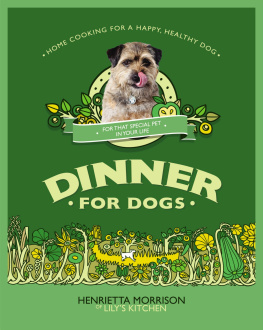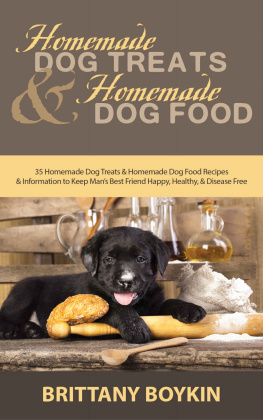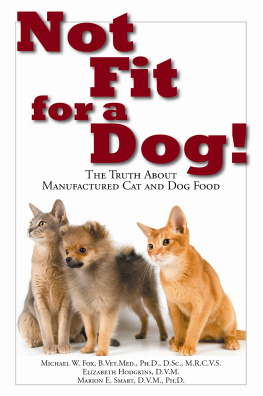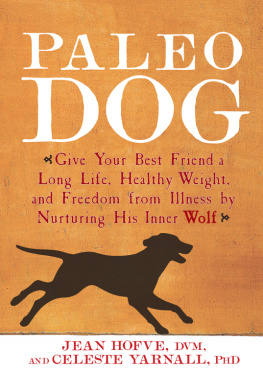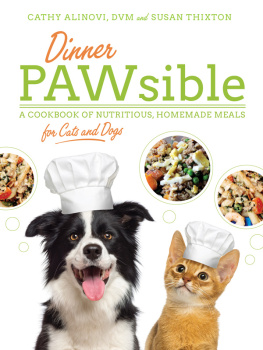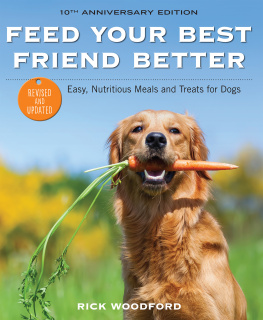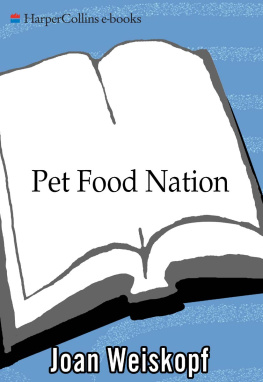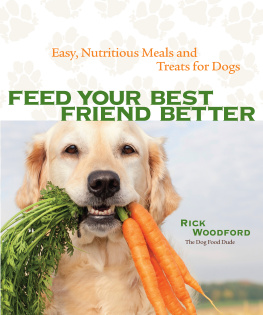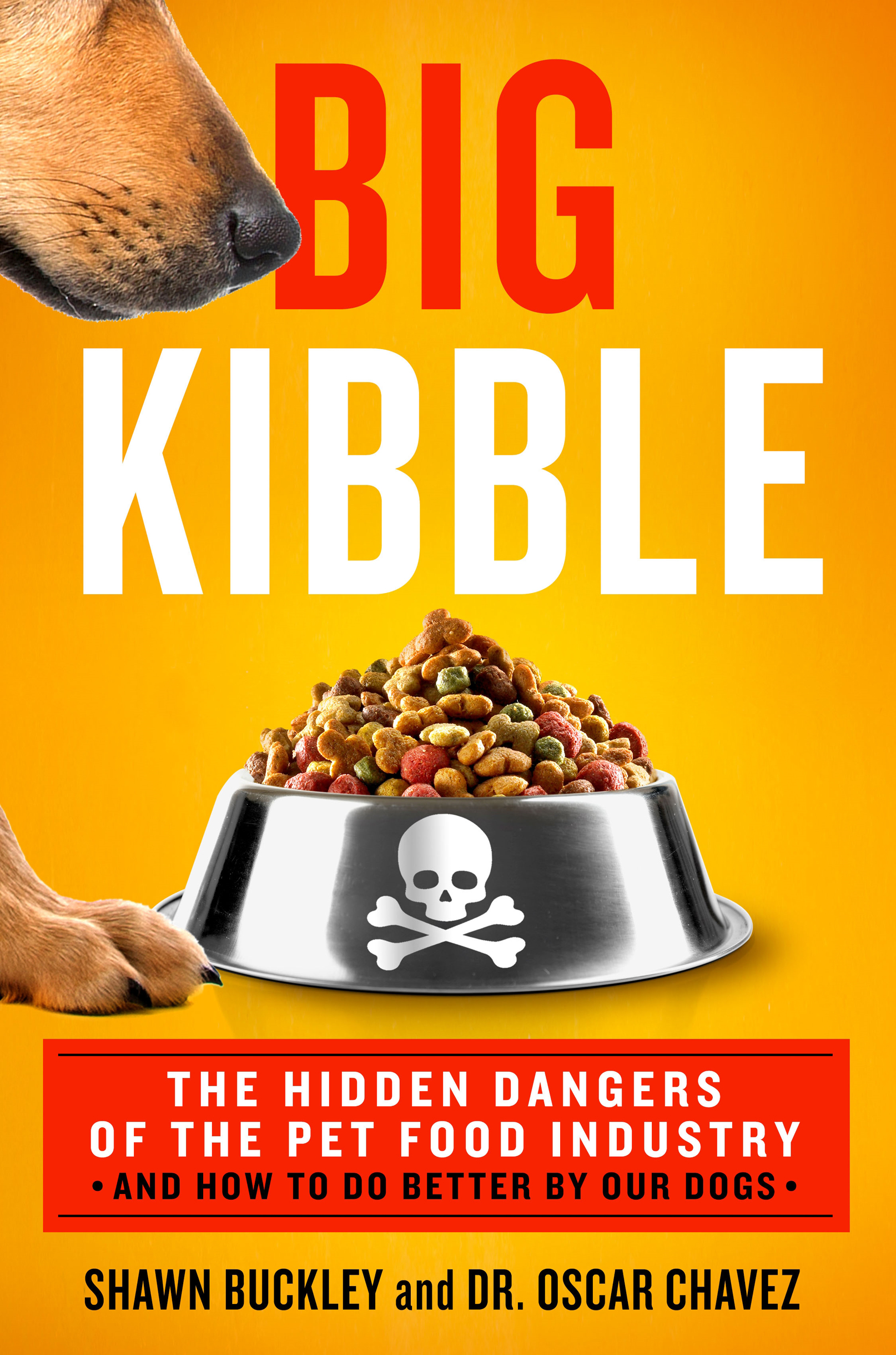This book is written and published for informational purposes only and is not intended to replace the advice of each readers own veterinarian or other licensed professional. As a pet parent, you should consult a veterinary professional in all matters relating to your dogs diet, health, and well-being, especially if your dog has existing, or appears to be developing, chronic medical conditions, and before starting, stopping, or changing the medications your dog is taking, or any nutritional or health regimen your dog is following, under the supervision of a veterinarian or other licensed professional.
The intention of this book is to alert pet parents to the issuesand all too often the perilspresented by Big Kibbles mass-produced, feed-grade dog food, in order to raise awareness. It is not intended to give veterinary or individualized nutritional advice.
The fact that a veterinarian, medical professional, organization, or website is mentioned in this book, as a potential source of information or products, does not mean that the author or the publisher endorse any particular veterinarian or other professional, or the information they may provide or the food or other nutritional products they may recommend or produce.
Again, pet parents are solely responsible for the health and nutritional decisions they make for their dogs, under the guidance of a veterinary professional.
May you be as good a person as your dog thinks you are.
Unknown
Elise Maitland long considered her dog, Michigan, a member of the family. Shed been reluctant to adopt the collie-Labrador mix initially; as a single mom of four, she wasnt eager to take on a fifth dependent. But Michigan, then just a puppy, quickly won her over with his protective nature. He seemed determined to help the Ontario, Canada, mother keep an eye on her kids.
Labradors are the most popular dog breed in America, for good reason. They are loved for their friendliness, and for their affectionate, boisterous, outgoing nature. Colliesthe Lassie Come Home dogare known for their loyalty and intelligence, and for being devoted to their human families. Michigan was a perfect combination of the two breeds, and he helped keep his family safe and happy for a dozen years.
But then one day, something upsetting happened. Michigan suddenly lost control of his bowels. The next day, it got worse, with bloody fluid oozing out of the familys beloved dog. Elise got Michigan into the car after midnight and drove to the emergency clinic, more than thirty minutes away.
The clinic kept Michigan overnight. A few days and more than a thousand dollars later, Elise finally took him home, his diagnosis unclear. He never fully recovered, and died about a year later of kidney failure. What could have caused this otherwise healthy dog to develop kidney disease?
His food, as it turned out.
As Elise later learned, thousands of pet parents throughout North America had been unwittingly feeding their dogs commercial dog feed laced with melamine, a plastic that can lead to kidney disease and kidney failure if eaten. But why would Michigan, or any other dog, have eaten melamine? No pet parent would intentionally feed a dog melamine.
As it turned out, two Chinese manufacturers and a U.S.-based importer were involved in a scheme to add melamine to wheat gluten to boost its apparent protein levels in lab tests. Before they were caught, theyd sold it to a dozen pet feed manufacturers in North America that incorporated it into more than one hundred and fifty different brands, which then got poured into the bowls of tens of thousands of pets around the continent. Finally, this intentional contamination of dog feed was discovered and led to the biggest pet food recall ever, in 2007.
For many dogs, however, the recall came too late. Michigan ingested the melamine in his daily bowl of Ol Roy, the private label feed sold by Walmart that is one of the least expensive kibbles on the market. On the other end of North America, a very fancy little Japanese Chin, owned by a retiree living outside Orlando, Florida, died of melamine poisoning from more expensive canned feed. The melamine turned up in homes across the continent, from the biggest names in pet food, including Nestl Purina PetCare and Mars Petcare, to more boutique-sounding ones such as Natural Balance and Royal Canin.
William Howell, pet parent of the poisoned Japanese chin, had specifically bought expensive pet feed, thinking it would be safer for his dog. He described watching his little, long-haired dog writhe in pain for several days, before he finally decided to euthanize him to end his suffering. Somebody should be held responsible, he later said.
Somebody should be held responsible, but no one was, at least not in a way that would protect pets in the future. Both Elise and William were part of an eventual class-action lawsuit that included some twenty thousand pet parents. The suit settled for $24 million in 2011. This sounds like a lot of money, but for thousands of individual pet parents involved, their share of the settlement failed to cover the costs associated with caring for their sick dogslet alone make up for the emotional loss of their pets. The five hundred dollars I received did not even pay the vet bill, let alone a new pet, Elise later told a news reporter.
The melamine contamination was one of the worst pet feed scandals in recent years, but not, unfortunately, the only one. Nor did the scale of the disaster lead to changes that truly protect our dogs. A decade later, in 2017, the ABC News station covering the Washington, D.C., area looked into reports of pentobarbital poisoning in dog food, hiring a lab to test more than two dozen brands of wet dog foods. When they got to Gravy Train, nine out of fifteen cans of the brand tested positive for pentobarbital.
This investigation came after yet another, earlier report about pentobarbital in dog feed killing dogs in the Pacific Northwest. Pentobarbital is a barbiturate, a powerful drug commonly used for euthanizing animals, such as dogs and cats in shelters, and horses. It should not be in food, in any quantity, ever. Most commercial pet food is made from feed-grade ingredients, not food-grade. (Despite the appetizing pictures on the cans and bags.) Feed grade ingredients do not have to come from the same sources or follow the same protocols for safety and sanitation as food intended for human consumption. Rules and guidelines that do exist for feed are not always enforced, nor is there consistent oversight from state to state.
These stories are among the most shocking cases of contamination in pet food in recent years, but they are by no means the only ones. Pentobarbital, for example, has been found in pet food for years, as well as other adulterantssome that have killed thousands of dogs.
Big Pharma. Big Tobacco.


